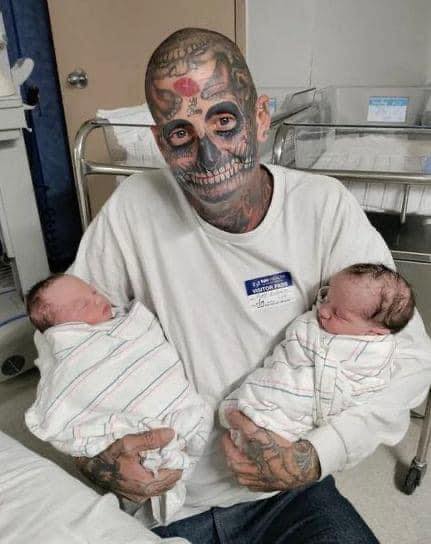In a world where self-expression is celebrated in various forms, body art stands as one of the most striking ways to showcase individuality. Richard Huff, a 51-year-old father, embraces this art form wholeheartedly, calling himself an “ink addict.” With over 240 tattoos covering most of his body, Richard has transformed himself into a living canvas, each piece representing personal stories and milestones. But his passion for tattoos hasn’t come without challenges—he’s often met with harsh criticism and online bullying, with some labeling him a “monster” and even questioning his abilities as a parent.

Richard and his wife, Marita, are proud parents of seven children. Their family life is much like any other, except for Richard’s extensive body art, which is both a personal journey and a means of storytelling. Despite their normalcy, strangers often react negatively to Richard’s appearance, which has sometimes led to hurtful assumptions about his character. Yet, to Richard, his tattoos are not just ink—they’re chapters of his life, a visible testament to who he is and what he values.
The Start of a Tattoo Journey
Richard’s love for tattoos started at the young age of 17, and he admits it quickly became an addiction. Beginning with small designs on his legs, he eventually expanded to larger works that now cover about 85% of his body. His tattoos hold deep significance—many include his children’s names, with one even featuring an imprint of his daughter’s lips. Richard aims to be fully covered in ink within the next four years, as he finds both the artistic process and the pain of tattooing fascinating.
His heavily tattooed appearance, however, has sometimes led to problems, especially in public spaces. For instance, children at his kids’ school have occasionally found Richard intimidating. But Richard’s daughter is quick to defend him: “They think he’s scary, but I know my dad is not scary. He’s actually really talented with tattoos.” Her words reflect the strong bond they share, one that transcends appearances.
Overcoming Judgments
Marita, Richard’s wife, initially had reservations about his look. She admits, “I judged Richard by his looks at first, but after getting to know him, I discovered he has a kind heart.” Despite her initial doubts, Marita now stands by her husband, seeing past the ink to the man who loves his family deeply.
Richard remains an active and involved father, despite the criticism he faces. He regularly attends PTA meetings, participates in his children’s activities, and fosters a warm family environment. While online trolls may question his facial tattoos, others support him, acknowledging that his devotion to his family far outweighs any surface-level judgments. Richard firmly believes that his tattoos don’t make him a bad father. Instead, they offer his children a unique perspective on life and individuality.
Defying Stereotypes with Love
Richard doesn’t let negative opinions deter him. He’s built a resilience against online harassment, often using it as an opportunity to teach his children about embracing differences. He believes that the criticism he receives often says more about the critics than it does about him. For Richard, his tattoos are a form of self-expression that he proudly carries, regardless of others’ perceptions.
To Richard, tattoos are more than mere designs—they are symbols of personal milestones, memories, and moments that matter. Just like life, tattoos can be both bold and subtle, each with its own story. Richard’s narrative shows that parenting isn’t about fitting into a conventional mold; it’s about love, dedication, and setting a positive example for children. His inked skin is merely a surface detail, one that reflects a deeper story of self-expression, authenticity, and the importance of living life on his own terms.
Ultimately, Richard’s journey with tattoos serves as a reminder that self-expression should not be confined by societal norms. His story challenges the notion that outward appearances define one’s character or parenting abilities. Instead, he proves that love, integrity, and commitment run deeper than skin—even when it’s covered in ink.



